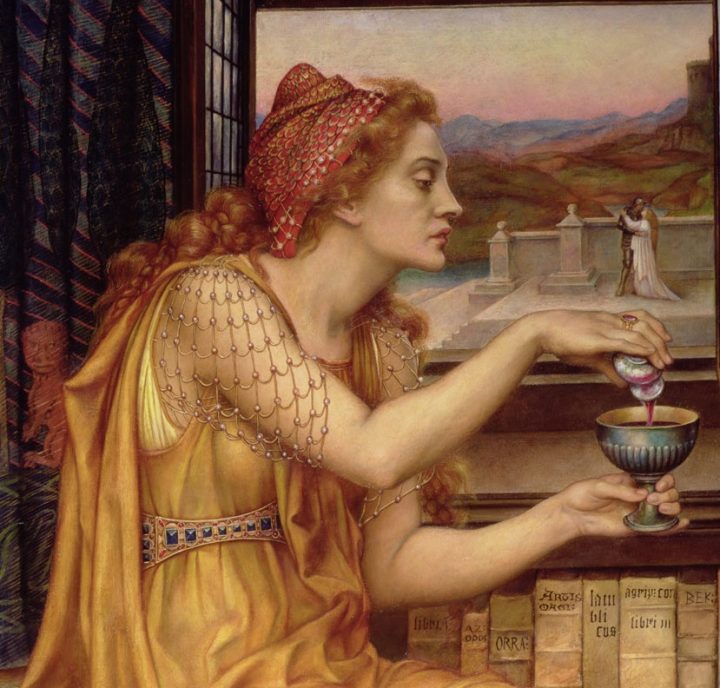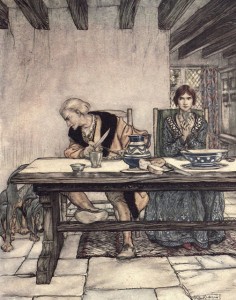Lord Ronald, my Son è la Child #12, F raccolta da Robert Burns nell’Ayrshire sulla melodia “Lochaber no more” e stampata ne The Scots Musical Museum (1787)
Sir Walter Scott associò la ballata con la morte di Thomas Randolph (Randal), Conte di Murray (Moray), che morì nel 1332 in modo inaspettato (e ci fu chi pensò al veleno).
Si tratta della variante ritrovata in Scozia della Lord Randal, ovvero il tema “testamento dell’avvelenato”.
Qui la ballata ha tuttavia un testo molto breve, mutilo della parte testamentaria.
Così commenta Robert Riddell in merito alla melodia abbinata “Questa melodia, molto apprezzata nell’Ayrshire, è evidentemente l’originale ” Lochaber “. La maggior parte delle nostre arie più moderne ha avuto così la sua origine: alcuni dei primi cantori, o musicisti pastori, compongono la semplice rudimentale melodia, che è stata ripresa dal musicista moderno più istruito per assumere la forma finale migliorata”.
[english translation]
Lord Ronald, my Son is Child # 12, F collected by Robert Burns in Ayrshire on the melody “Lochaber no more” and printed in The Scots Musical Museum (1787)
Sir Walter Scott associated this ballad with the death of Thomas Randolph (Randal), Earl of Murray (Moray), who died unexpectedly in 1332 (and there was suspicion of poisoning.)
This is the variant found in Scotland of Lord Randal, or the theme “testament of the poisoned”.
However, here it has a very short text, mutilated by the testamentary part.
Robert Riddell notes about the matched melody “‘This air, a very favorite one in Ayrshire, is evidently the original of’ Lochaber. In this manner, most of our finest more modern airs have had their origin. Some early minstrel, or musical shepherd, composed of the simple artless original air, which was picked up by the more learned modern musician took the improved form it bears. “ (from here)

Traduzione italiana di Cattia Salto
MADRE: Dove sei stato Lord Ronald, figlio mio?
Dove sei stato Lord Ronald, figlio mio?
FIGLIO: Dalla mia innamorata,
Madre, preparami subito il letto
perchè sono stanco della caccia
e voglio stendermi.
MADRE Cosa hai preso dalla tua innamorata,
Cosa hai preso dalla tua innamorata,
FIGLIO: Un veleno mortale
Madre, preparami subito il letto
perchè la vita è un fardello
che presto poserò”
NOTE
1) il veleno somministrato dall’amante tradita potrebbe essere stato estratto dalle bacche di Dulcamara come in The Wild, Wild Beerry
“O where hae ye been, Lord Ronald, my son?
O where hae ye been, Lord Ronald, my son?”
“I hae been wi’ my sweetheart,
mother, make my bed soon;
For I’m weary wi’ the hunting,
and fain wad lie down.”
“What got ye frae your sweetheart,
What got ye frae your sweetheart,
“I hae got deadly poison (1),
mother, make my bed soon;
For life is a burden
that soon I’ll lay down.”
NOTE
1) the poison administered by the betrayed lover may have been extracted from the Dulcamara berries as in The Wild, Wild Beerry
LINK
http://www.burnsscotland.com/items/v/volume-iv,-song-327,-page-337-lord-ronald-my-son.aspx
http://bluegrassmessengers.com/lord-ronald-my-son–robert-burns-1793-child-f.aspx
http://www.joe-offer.com/folkinfo/songs/107.html
VERSIONI SCOZZESI
Lord Randal (Child # 12) -Scottish version
Ciod è a ghaoil a tha ort – scottis gaelic version
Lord Ronald, my Son (Robert Burns)
Croodin doo (nursery rhyme)
VERSIONI IRLANDESI
Henry my Son (Irish version)
Amhrán na hEascainne (gaelic irish version)
ALTRE VERSIONI
The Wild, wild Berry (english version from Shropshire)
Billy Boy (sea shanty)
“Il testamento dell’avvelenato” (Italian version)
Jimmy Randal (John Jacob Niles)

